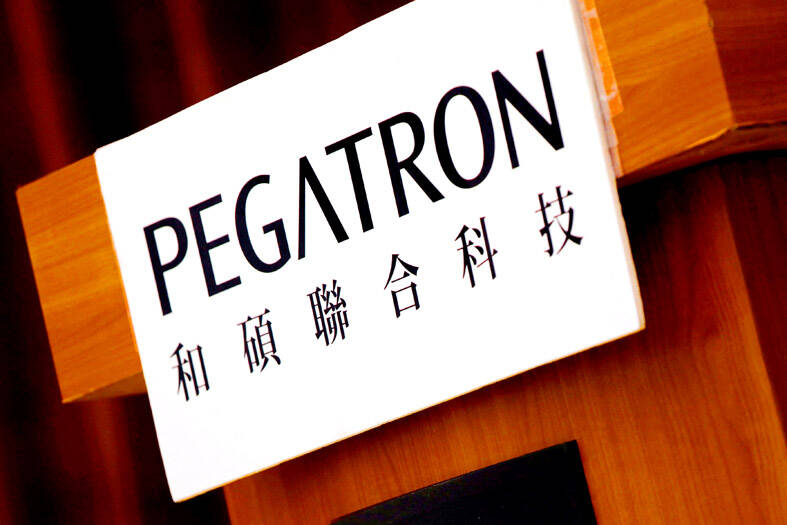IPhone assembler Pegatron Corp (和碩) yesterday said its net profit increased 1.5 percent annually last quarter as the growth of higher-margin auto product shipments offset the weakness in the consumer electronics segment.
Net profit grew to NT$4.98 billion (US$153.5 million) during the July-to-September quarter, compared with NT$4.83 billion a year earlier. That represented a sequential decline of 19.7 percent from NT$6.21 billion as the company booked massive asset disposal gains during the second quarter.
During the first three quarters, net profit swelled 29 percent year-on-year to NT$14.97 billion from NT$11.61 billion. Earnings per share surged to NT$4.93 from NT$4.02, while gross margin improved to 4.3 percent from 3.6 percent.

Photo: Reuters
However, revenue shrank 12.7 percent year-on-year to NT$798.35 billion in the first three quarters. More than 60 percent of the company’s revenue came from smartphones and networking devices, it said.
Pegatron expects to return to a growth path next year after riding through a trough this year amid sluggish consumer electronics demand, the company said.
Aside from its core business, Pegatron made inroads into two new businesses in recent years — auto and server businesses. The company expects to ship its first high-end artificial intelligence (AI) servers powered by Nvidia Corp’s advanced GB200 chips in the first quarter of next year, it said.
“Pegatron is a newcomer to the server business, but we have high hopes for our server team,” company president and chief executive officer Gary Cheng (鄭光治) told an investors conference yesterday.
“Our efforts over the past 2 years should bear fruit in 2025,” Cheng said.
Pegatron is shipping servers to enterprises such as the nation’s major semiconductor firms, and second-tier and third-tier cloud service providers (CSPs), Cheng said. The company’s ultimate goal is to supply servers to the world’s four major CSPs — Amazon.com Inc, Microsoft Corp, Meta Platforms Inc and Google, Cheng said.
The company’s progress in expanding its auto business is more pronounced, he said, expecting it to make up a double-digit percentage of its total revenue next year, compared with a mid-single-digit percentage this year, thanks to a diversified customer base and growth in orders, he added.
Pegatron counts Tesla Inc as its major client in the auto business and has invested US$75 million in a Mexico-based subsidiary this year to build up its auto parts capacity.
When asked how to cope with US president-elect Donald Trump’s new trade policy, primarily tariff hikes, Pegatron president and chief executive officer Johnson Teng (鄧國彥) said the company has diversified its manufacturing footprints globally with production sites in Mexico, India and the US. The company is also exploring cooperation with partners to farm out production if needed, Teng said.
Pegatron operates a large facility in Indiana, but the manufacturing costs there are relatively expensive, Teng said.
If the US imposed higher tariffs on goods from Mexico, Pegatron would have the flexibility to ship products from Indiana in response to customers’ requests, he said.

DOLLAR CHALLENGE: BRICS countries’ growing share of global GDP threatens the US dollar’s dominance, which some member states seek to displace for world trade US president-elect Donald Trump on Saturday threatened 100 percent tariffs against a bloc of nine nations if they act to undermine the US dollar. His threat was directed at countries in the so-called BRICS alliance, which consists of Brazil, Russia, India, China, South Africa, Egypt, Ethiopia, Iran and the United Arab Emirates. Turkey, Azerbaijan and Malaysia have applied to become members and several other countries have expressed interest in joining. While the US dollar is by far the most-used currency in global business and has survived past challenges to its preeminence, members of the alliance and other developing nations say they are fed

LIMITED MEASURES: The proposed restrictions on Chinese chip exports are weaker than previously considered, following lobbying by major US firms, sources said US President Joe Biden’s administration is weighing additional curbs on sales of semiconductor equipment and artificial intelligence (AI) memory chips to China that would escalate the US crackdown on Beijing’s tech ambitions, but stop short of some stricter measures previously considered, said sources familiar with the matter. The restrictions could be unveiled as soon as next week, said the sources, who emphasized that the timing and contours of the rules have changed several times, and that nothing is final until they are published. The measures follow months of deliberations by US officials, negotiations with allies in Japan and the Netherlands, and

Qualcomm Inc’s interest in pursuing an acquisition of Intel Corp has cooled, people familiar with the matter said, upending what would have likely been one of the largest technology deals of all time. The complexities associated with acquiring all of Intel has made a deal less attractive to Qualcomm, said some of the people, asking not to be identified discussing confidential matters. It is always possible Qualcomm looks at pieces of Intel instead or rekindles its interest later, they added. Representatives for Qualcomm and Intel declined to comment. Qualcomm made a preliminary approach to Intel on a possible takeover, Bloomberg News and other media

Foxconn Technology Group (富士康科技集團) yesterday said it expects any impact of new tariffs from US president-elect Donald Trump to hit the company less than its rivals, citing its global manufacturing footprint. Young Liu (劉揚偉), chairman of the contract manufacturer and key Apple Inc supplier, told reporters after a forum in Taipei that it saw the primary impact of any fresh tariffs falling on its clients because its business model is based on contract manufacturing. “Clients may decide to shift production locations, but looking at Foxconn’s global footprint, we are ahead. As a result, the impact on us is likely smaller compared to